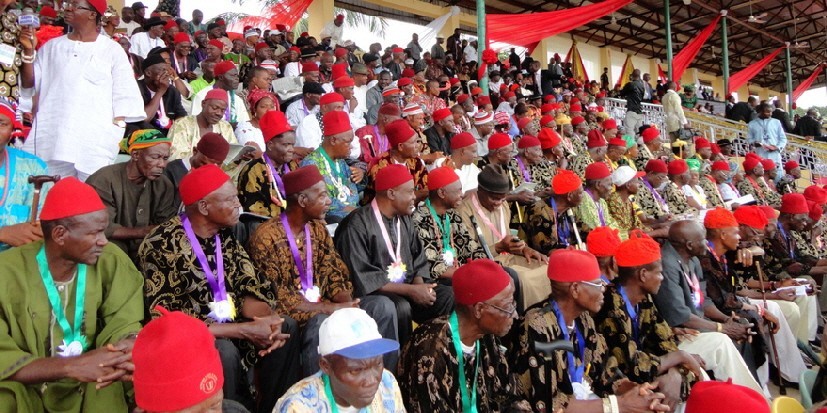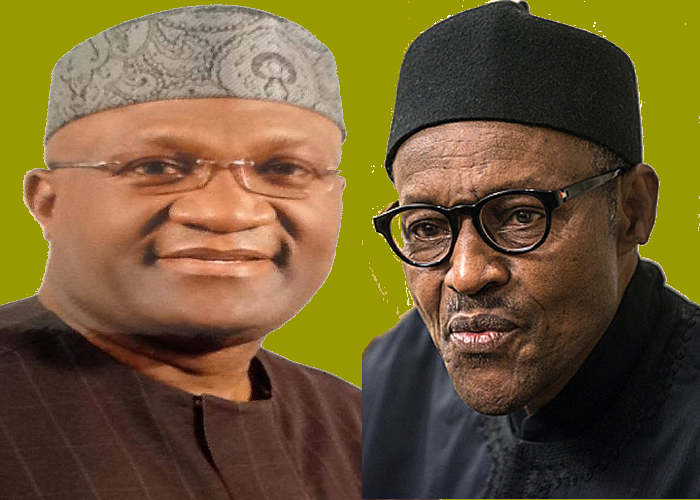 The Igbo nation have again amplified its stance on the ongoing discussion in Nigeria with a unanimous vote for the restructuring of Nigeria. They say restructuring remains the only way forward if Nigeria were indeed serious about getting out of its present quagmire. Aside from that position, Ohanaeze, the apex cultural and political organization of Igbo, yesterday also rejected the declaration of the Indigenous Peoples of Biafra (IPOB) as a terrorist organisation. It described the action as “unfair, discriminatory and overhanded.” Ohanaeze’s President-General John Nnia Nwodo said the Southeast had been over policed to intimidate and hold down the Igbo.
The Igbo nation have again amplified its stance on the ongoing discussion in Nigeria with a unanimous vote for the restructuring of Nigeria. They say restructuring remains the only way forward if Nigeria were indeed serious about getting out of its present quagmire. Aside from that position, Ohanaeze, the apex cultural and political organization of Igbo, yesterday also rejected the declaration of the Indigenous Peoples of Biafra (IPOB) as a terrorist organisation. It described the action as “unfair, discriminatory and overhanded.” Ohanaeze’s President-General John Nnia Nwodo said the Southeast had been over policed to intimidate and hold down the Igbo.
With all sorts of injustice the present government is meting out to the Igbo people of Nigeria, Nwodo said, the endurance of the Igbo is being stretched beyond elastic limit. He said despite the October 1 quit notice given to the Igbo in the North, the Arewa Youths Council, which issued the deadline, was treated with kid gloves by the government of Muhammadu Buhari. Nwodo insisted that restructuring the country was the way out of its problems. He said the agitation for restructuring was not anti-North. He made the declaration at a lecture at the Royal Institute of International Affairs, Chatham House, London.
In the text, which was released to repoprters by Nwodo’s Media Adviser, Mr. Ike Abonyi, the Ohanaeze President said “never in the history of Nigeria has there been unanimity for the reshaping of the country as it is now.” Nwodo said: “The declaration of IPOB as a terrorist organization is in my view hurried, unfair, and not in conformity with the intendment of the law. Whereas I am not completely in agreement with some of the methods of IPOB, like it’s inappropriate and divisive broadcast, the uncontested evidence given by the Attorney-General of the Federation in an interlocutory action claiming that IPOB attempted and/or actually snatched guns from law enforcement agents are, if proven, merely criminal offences.
“They do not constitute enough evidence to meet international law definitions of a terrorist organisation. Happily, the United States Embassy in Nigeria only three days ago shared this conclusion and asserted that the United States Government does not recognise IPOB as a terrorist organisation. This same unarmed IPOB that is being stigmatised by the Nigerian government had its members murdered in Asaba, Nkpor, Aba and Port Harcourt simply for having public demonstrations without the Federal Government ordering a judicial inquiry.
“Instead, after I called for one and Amnesty International provided evidence that 150 of them were killed, the Chief of Army Staff set up an inquiry composed of serving and retired army officers, thus abandoning the rules of natural justice, which prescribes that you cannot be a judge in your own court.”
Nwodo spoke on the mindset of the Igbo on the proscription of IPOB. He said: “The Igbo in Nigeria feel the treatment of IPOB as unfair, discriminatory and overhanded. They see the move as an attempt to encourage a profiling of Igbos in the international security arena. We know of other self-determination groups in Nigeria that are armed and have destroyed government and private sector installations and wells that government prefers to negotiate with rather than label them as terrorist organisations. Fulani herdsmen, otherwise called the Fulani militants, have ravaged farms in Middle Belt, South West, and South Eastern Nigeria, killing several farmers in the process. In January 2016, they killed 500 farmers and their families in Agatu in Benue state. In Enugu State, they murdered more than 100 farmers in Ukpabi Nimbo in April 2016.
“Photographs depicting them with automatic rifles trend in the entire world media, yet not one of them is facing criminal charges, nor is Operation Python Dance being conducted in the areas where they ravage and kill and the Federal Government describes them as criminals and not a terrorist organization, notwithstanding their classification by the Global Terrorist Index as the fourth deadliest terrorist group in the world (see British Independent Newspaper, 18th November 2015). The London Guardian Newspaper of 12th July 2016 indicated that Fulani herdsmen killed 1000 people in 2014.” The Ohanaeze President declared that the endurance of the Igbo was being overstretched.
According to him, “In Nigeria, Ndigbo, whose social-cultural organisation I lead are, notwithstanding their historical experiences in Nigeria, the most loyal ethnic group to the concept of one Nigeria. We are the largest ethnic group other than the indigenous group in any part of Nigeria. We invest and contribute to the economic and social life of the communities wherever we live. We are proudly Christians but very accommodating of our brothers of other religious persuasions. We are grossly marginalised and still treated by the Federal Government as second-class citizens. No Igbo man, for instance, heads any security arm of the Nigerian Armed Forces. Our area is the most heavily policed as if there was a deliberate policy to intimidate us and hold us down.
“Our endurance has been stretched beyond Hooke’s gauge for elastic limit. The deployment of the Nigerian Army under the guise of Operation Python Dance to the South East was unconstitutional under Section 271 of the 1999 Constitution. Deployment of the army is only allowed in circumstances of insurrection, terrorism and external aggression, not in killing of priests, or fighting kidnapping. And in those circumstances where they can be deployed, leave of the Senate must be sought. This brazen impunity in dealing with matters, which concern the South East is provocative.” Nwodo went on: “The Arewa Youths Council, by issuing a quit notice for Igbos to leave Northern Nigeria and declaring a Federal Republic of Nigeria without Igboland, had committed serious infractions of the law. First by declaring a new Republic of Nigeria, which excises the South East unilaterally, they were committing treason.” He said the agitation for restructuring was not anti-North as being speculated by some Nigerians.
His words: “The only hope for change in Nigeria today is the rising call for restructuring pioneered by the Southern leadership forum, supported lately by ex-Vice-President Atiku Abubakar, former President Ibrahim Babangida and leaders of the Middle Belt including Dan Suleiman and Prof. Jerry Gana. Our expectation is that now that our President is fully recovered and back to work, he will address the situation by constituting a nationwide conversation of all ethnic nationalities to look into the 2014 National Conference report and the trending views on this subject matter so as to come up with a consensus proposal that the national and state assemblies will be persuaded to adopt.





